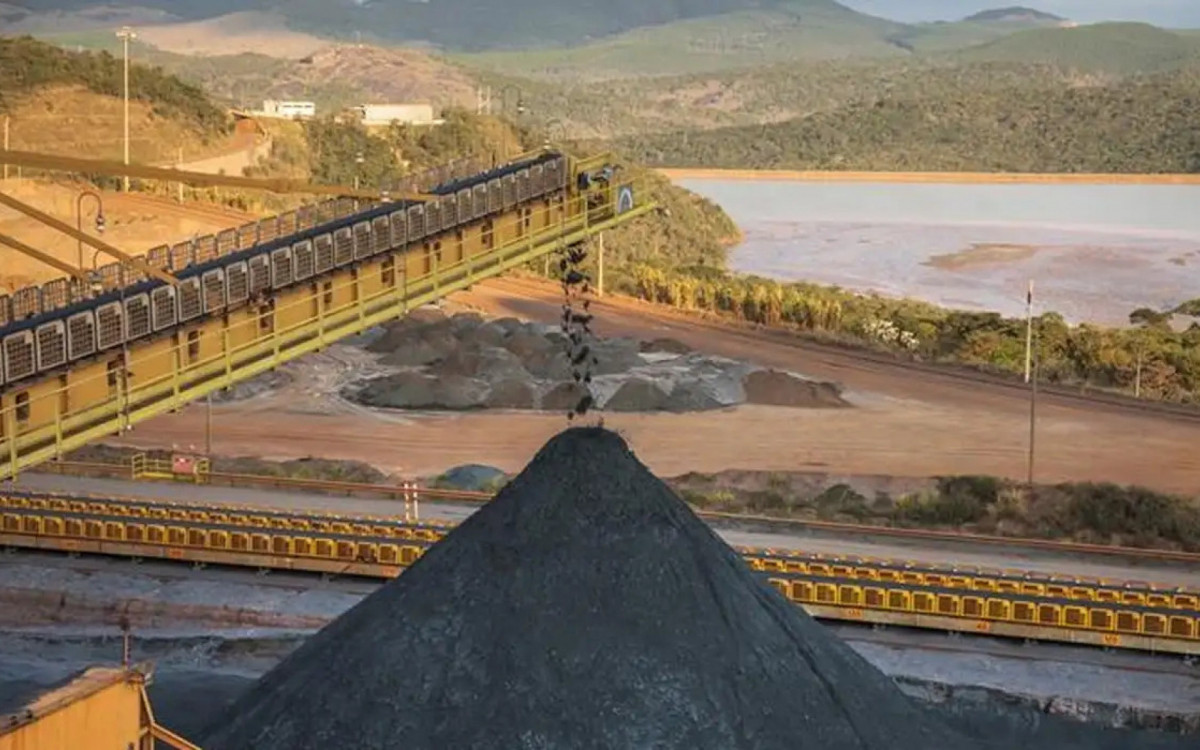
Sector revenue in the first quarter reached R$68 billionRicardo Teles/Portal Brasil.gov.br
Published 05/05/2024 16:27
The data was presented last Thursday (2) by the Brazilian Mining Institute (Ibram), which represents the largest mining companies in the country. In addition to detailing the results, the entity’s directors criticized the implementation of the Selective Tax, as provided for in the tax reform.
The sector’s revenue in the first quarter of 2024 was R$68 billion. The 25% increase was mainly driven by the two most mining states in the country, which registered expansion above the national average. Minas Gerais, with an increase of 29% compared to the same period last year, achieved revenue of R$28.2 billion. Pará rose 34%, reaching R$ 25.1 billion.
Iron ore accounted for 64.2% of all sector revenue and easily tops the list of products with the greatest impact on performance. Next come copper, with a 7% share, and gold, with 6.8%.
“This year’s rains did not have as negative an impact as in the past. The first quarter is a period where there is usually the impact of heavy rains. And this year, fortunately, they were better distributed. This affected production less. That’s why , we also had these better results”, said Julio Nery, sustainability director at Ibram.
He added that projections are also optimistic for the remainder of the year, which has been reinforced by partial reports produced by mining companies.
Selective Tax
The Selective Tax has selectivity as its principle, that is, it uses taxation to discourage the consumption of selected goods. It was adopted by other nations and was nicknamed in English as Sin Tax (sin tax, in literal translation).
In Brazil, it is one of the new taxes foreseen in the tax reform approved last year by the National Congress. Article 153 of the Federal Constitution was amended to include a new section. It establishes a tax on the production, extraction, sale or import of goods and services that are harmful to health or the environment.
The tax reform, however, established the need for a Complementary Law to regulate the tax. It must define which products will be taxed, as well as the rates and rules. Thus, the discussion involves Complementary Bill 68/2024, recently presented by the federal government. It provides for the incidence of Selective Tax on vehicles, vessels and aircraft, tobacco products, alcoholic beverages, sugary drinks and extracted mineral goods.
“There is no doubt that it reduces the attractiveness of Brazil as a destination because I am messing with something that has sophisticated, long-term planning. The iron ore market is an extremely sophisticated market, contracts are negotiated well in advance,” said Mancin .
In addition to creating the Selective Tax, the tax reform established that – from 2033 – ICMS and IPI will be unified with three other taxes (ISS, PIS and Cofins), in order to simplify the system. There would, therefore, be a single charge, with the collection being divided between the federal sphere (Contribution on Goods and Services – CBS) and the state and municipal spheres (Tax on Goods and Services – IBS). According to Mancin, Ibram has a convergent vision with the tax reform, however, it does not agree with the collection of the Selective Tax.
Mining map
The director of IBRAM, Raul Jungmann, speaks during the celebration of the 46th anniversary of the Brazilian Mining Institute (Ibram), Raul Jungmann is concerned about projects being processed in Congress without the necessary discussion – Photo – Fabio Rodrigues-Pozzebom/ Agência Brasil
The data reveals that, since 2018, mining areas – including legal and illegal activities – exceed industrial mining areas. It also indicates that mining as a whole advanced more than 600% in Brazil between 1985 and 2020.
In 2020, the last year that appears in the published survey, mining accounted for 107.8 thousand hectares. Industrial mining explored 98.3 thousand hectares. In terms of biomes, 72.50% of the entire mined area in Brazil is in the Amazon Forest. Another 14.7% are located in the Atlantic Forest and 9.9% in the Cerrado.
In the period between 1985 and 2020, the area mined within conservation units increased by around 300%. In these areas, mining is prohibited and therefore all activities that occur in them are illegal. “This is unacceptable. It’s a police case”, laments Jungmann. According to data from MapBiomas, currently 50% of mining occurs in conservation units or on indigenous lands, where the activity is also prohibited.
Jungmann expressed concern about bills being processed at a rapid pace in the Chamber and Senate, without the necessary discussion. According to him, there are proposals that facilitate the expansion of mining and that open up space to end up benefiting the illegal practice. Furthermore, he criticizes the possibility that mining could advance into areas already granted to mining companies.
Illegal mining
It turns out that gold extracted from illegal areas is generally taken to regions where legal mining is active, where local intermediaries sell it to DTVMs. “We have already requested investigation of some DVTMs and we are being sued by them, with great pleasure because our position is vertically contrary to what they represent”, concluded Jungmann.
